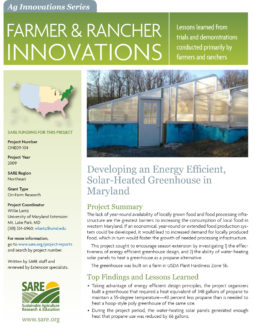The lack of year-round availability of locally grown food and food processing infrastructure are the greatest barriers to increasing the consumption of local food in western Maryland. If an economical, year-round or extended food production system could be developed, it would lead to increased demand for locally produced food, which in turn would foster the growth of needed processing infrastructure.
This project sought to encourage season extension by investigating 1) the effectiveness of energy efficient greenhouse design, and 2) the ability of water-heating solar panels to heat a greenhouse as a propane alternative.
The greenhouse was built on a farm in USDA Plant Hardiness Zone 5b.
About this series: Farmer and Rancher Innovations, part of the Ag Innovations series, capture the lessons learned from SARE-funded trials and demonstrations conducted primarily by farmers and ranchers.
Want more information? See the related SARE grant:
- Developing a Cost Effective, Energy Efficient Greenhouse Using Solar Heating to Extend the Growing Season (ONE09-104)
This material is based upon work that is supported by the National Institute of Food and Agriculture, U.S. Department of Agriculture through the Sustainable Agriculture Research and Education (SARE) program. Any opinions, findings, conclusions, or recommendations expressed in this publication are those of the author(s) and should not be construed to represent any official USDA or U.S. Government determination or policy.
